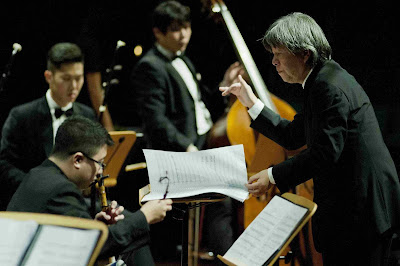MODERN
VOICES – CLASS OF 1978
Ding Yi
Music Company
Esplanade
Recital Studio
Saturday (3 August 2013 )
This review was published in The Straits Times on 5 August 2013 with the title "Invigorating mix in new music".
The year 1978 was an important one for Chinese music.
With Chairman Mao Zedong dead and the Cultural Revolution ended, the Central
Conservatory in Beijing
 The evening began with Zhou Long’s Mount A Long Wind (2004), scored for erhu, pipa, dizi, guzheng and percussion. Impressionist in
colour, the work inspired by Li Bai’s Xing
Lu Nan (The Hard Road) was
evocative of wind, water and nature’s elements. Poetic and meditative in part,
it also drew upon a raw primal energy that gave the concert a stirring opening.
The evening began with Zhou Long’s Mount A Long Wind (2004), scored for erhu, pipa, dizi, guzheng and percussion. Impressionist in
colour, the work inspired by Li Bai’s Xing
Lu Nan (The Hard Road) was
evocative of wind, water and nature’s elements. Poetic and meditative in part,
it also drew upon a raw primal energy that gave the concert a stirring opening.
 Tan Dun’s Ghost
Opera (1994) is one of his best known scores, almost a microcosm of his
entire well-exposed output. The parts played by a western string quartet (violinists
Siew Yi Li and Lim Hui, violist Mervyn Wong and cellist Lin Juan) and pipa
soloist Chua Yew Kok, all of whom multi-tasked as percussionists and vocalists,
were both visual and musical. The hall was cloaked in darkness, with spotlights
on the soloists and glass bowls of water.
Tan Dun’s Ghost
Opera (1994) is one of his best known scores, almost a microcosm of his
entire well-exposed output. The parts played by a western string quartet (violinists
Siew Yi Li and Lim Hui, violist Mervyn Wong and cellist Lin Juan) and pipa
soloist Chua Yew Kok, all of whom multi-tasked as percussionists and vocalists,
were both visual and musical. The hall was cloaked in darkness, with spotlights
on the soloists and glass bowls of water.
Music from a Bach Prelude merged with the Chinese folksong Xiao Bai Cai (Little Cabbage), shamanistic yelps and Shakespearean
quotes, traditions representing the “past”. The sounds of water (and the
effects of gongs being immersed), metal (percussion), stone (struck close to
resonating open mouths) and paper (a long roll being flapped in space) were the
symbols of “eternity”, played by performers of “now”.
This 40-minute theatrical experience played out as an enthralling dialogue between “ghosts” of the past and future, confronting the present. Its symbolism was not lost on the full-house audience, which greeted the convincing performance with a most stirring of ovations.
Chen Yi’s Huqin
Suite (1997) was brought on tour by the Singapore Symphony to Germany Singapore


 The concert closed with Extase III (2010) by Chen Qigang, well known for having been the
Music Director of the 2008
The concert closed with Extase III (2010) by Chen Qigang, well known for having been the
Music Director of the 2008 Concert photographs courtesy of Ding Yi Music Company.






No comments:
Post a Comment